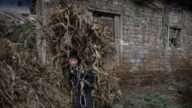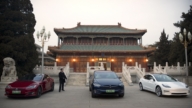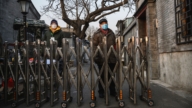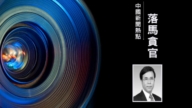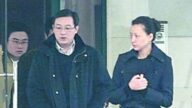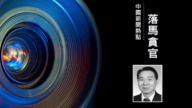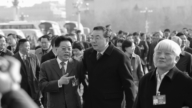【新唐人2013年08月17日訊】中共十八大後掌控宣傳工具的中共政治局常委劉雲山,在北戴河會議一結束就下達所謂的新任務,要求中共官員從「關門洗澡」提高到「開門納諫,接受群眾監督」。外界認為,中共的這一舉措,意味著所謂的整風運動全面升級,並且已經延伸到了黨外。經歷過大陸歷次運動的學者懷疑,這是否又是在重復中共前黨魁毛澤東的,那套通過「陽謀」來引蛇出洞的詭計。請看報導。
劉雲山於8月14號在北京召開的會議上,部署了中共整風運動的下一階段任務——查擺問題、開展批評環節。
早在今年4月19號,中共決定從下半年開始,用一年左右時間在全黨自上而下分批開展,所謂的黨的群眾路線教育實踐活動,劉雲山被任命為該項活動的領導小組組長。
在6月18號正式開啟的整風運動大會上,習近平要求官員「照鏡子、正衣冠、洗洗澡、治治病」, 以所謂的整風精神開展批評和自我批評。
旅美民運領袖張健指出,中共的整風運動的目的,一是對異己的打壓﹔二是控制輿論導向,把各個封疆大吏通過整風歸於自己的麾下,為自己去賣命﹔第三就是對全國老百姓更加進一步洗腦。
獨立評論員張健:「如果中共想聽取各方面的意見,有兩條路可以走,而且馬上就可以得到效果。第一就是取消管禁,第二讓這些海外所有的這些實際意義不同政見者發聲。」
張健認為,很多國外的專家學者,他們對中國的研究非常深入和到位,他們的聲音會是對中共很好的一面鏡子,能起到監督、批評和教育的作用。
不過張健同時指出,中共從建政以來,從來就沒有聽過人民的呼聲,人民只不過是他們的一個政治棋子。而歷次的中共整風運動都是打擊異己的手段,包括社會上開明人士以及中共內部的開明人士受到打壓。
1942年,毛澤東通過整風運動,不僅打擊了政治對手,正式登上了中共最高領導的位置,確定了中共的特權體制,同時還通過處決良心作家王實味,實現了黨對文藝的絕對控制。
毛澤東1957年發起的整風運動過程中掀起的「反右運動」,更是把55多萬知識份子打成右派。這些被發配的右派份子大量死亡在邊疆、農村、勞改農場和監獄中,至今97%沒有被平反。這場被稱為通過「陽謀」引蛇出洞的思想整肅,是歷史上焚書坑儒和文字獄的再演,反映了現代專制國家的政治欺騙和制度暴力。
山東大學退休教授孫文廣:「現在搞整風,那是不是又是一場陽謀呢?你要說清楚,不說清楚的話,只會走過場。整風就是提意見嗎,提意見你把媒體開放好了。」
山東大學退休教授孫文廣指出,港臺媒體有很多好文章,對中共批評很中肯,但是當局不允許引進來。而他寫的批評共產黨的書——《百年禍國》不讓進關,他家裏留的幾本也一律被抄走。
《法國國際廣播電臺》認為,中國出現的腐敗墮落、司法腐敗、兩極分化、裸官、人才流失、資金外逃、房哥、表叔等現象,本質上就是官員權力得不到控制、憲政沒有很好落實造成的。
孫文廣表示,中共從來沒有尊重過民意、尊重過民權,目前還在輿論上不斷批判憲政。前一段時間,有民間到馬路上要求官員公示財產,十幾人都被關到監獄裡。這一切都證明中共的整風運動只是擺設。
張健則指出,中共將會沿著專制的鐵軌運行下去的,一如既往的執行它的獨裁,直到被人民推翻。
採訪/朱智善 編輯/宋風 後製/周天
Communist Ideological Rectification Movement Upgrades
A new task was recently assigned by Liu Yunshan,
propaganda chief of the Chinese Communist Party (CCP).
It requires a change by the CCP officials to
“open the door to accept opinions and watchdogging”,
from previously “closing the door to take a bath.”
Observers say this signals an overall upgrade of
the CCP’s recent ideological rectification movement.
The movement has even expanded outside the CCP.
Scholars in China are casting doubt on the motives behind it—
whether it is another “overt conspiracy” by Mao Zedong
to entrap the innocent people once again?
On 14th August, at a meeting, Liu Yunshan assigned tasks
for the next phase of the ideological rectification movement.
That is, to investigate and unveil problems, and
to undergo criticism sessions.
In April, the CCP decided to invest one year to carry out
a top-down education on the Party’s mass line.
Liu Yunshan was appointed to head the drive.
In June, the CCP kicked off the ideological
rectification movement.
At the assembly, Xi Jinping required the CCP officials
to “look in the mirror, take a bath and to cure diseases.”
It demanded the officials to undergo criticism
and self-criticism.
Zhang Jian, a leading pro-democracy activist
in the US, comments.
He points out three goals of CCP rectification movement.
1. suppression of dissidents;
2. brainwashing to make regional governors
all slaves to the CCP;
3. an in-depth brainwashing of nationwide civilians.
Zhang Jian: “If the CCP wants to be advised,
it has two ways to go, which can produce immediate effect.
1. lifting the ban on civil rights;
2. allowing overseas dissidents to express freely.”
Zhang Jian says that many overseas experts and scholars
have made very in-depth studies of China.
Their opinions form a good mirror for the CCP
on watchdogging, criticism and education.
Zhang Jian also indicates that the CCP has never really paid
heed to the people, since it began its rule of China in 1949.
The CCP has always taken the populace as a political pawn.
In history, its ideological rectification movements were
all approaches taken to crack down on dissidents
including those liberals inside or outside the CCP.
In 1942, Mao Zedong launched a rectification movement
in Yan’an, the then communist base of the CCP.
The ideological mass movement helped Mao eliminate
political opponents, establish his top leadership
and the CCP’s privilege system.
Yan’an Rectification Movement killed Wang Shiwei,
a famous writer in Yan’an, which finalized the CCP’s
absolute control over the art.
Mao started another rectification movement in 1957,
and it triggered the “Anti-Rightist Movement".
Over 550,000 intellectuals were convicted as “the Rightist”.
A great number of them finally died on the frontier areas,
remote rural areas, reform-through-labor farms or prisons.
Until today, 97% of these “Rightists”
have not yet been vindicated.
It was an ideological purging movement,
put on under Mao’s “overt conspiracy”.
It recurred official persecutions of intellectuals
in ancient China,
a real-life proof mirroring of political deception
and violence in the modern authoritarian state.
(A retired professor of Shandong University) Sun Wenguang:
“Is the current ideological rectification another
overt conspiracy or not?
The CCP should make it clear, otherwise,
it would be just going through the motions.
The ideological rectification refers to lodging complaints,
then it suffices to lift bans on the media.”
Sun Wenguang says that Hong Kong and Taiwan media
have published lots of good articles that criticize the CCP.
Yet these publications are banned in the mainland.
Sun has written a book criticizing the CCP,
“100-year calamity to the nation”.
It is banned from being carried into China.
Even several copies he kept at home were
all forcibly taken away by the CCP authorities.
The Radio France Internationale comments.
China’s current problems, such as corruption, judicial
injustice, polarization, naked officials, brain drain,
capital flight, and multiple-house-owner officials,
in essence are a result of the officials’ power going
unchecked and constitutionalism hasn’t been put into practice.
Sun Wenguang remarks that the CCP has never
respected public opinion and civil rights.
Today, its criticism of constitutionalism still continues.
Earlier on, over a dozen citizens had been jailed
for requesting the CCP officials to declare their assets.
All this proves that the CCP’s rectification campaign
is just a pretense, says Sun.
Zhang Jian believes that the CCP will continue along
its autocratic track, until being toppled by the people.


